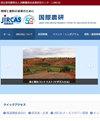The Impact of COVID-19 on Global Indica and Japonica Rice Markets: Examining by an Endogenous Agricultural Investment Model
IF 0.5
4区 农林科学
Q4 AGRICULTURE, MULTIDISCIPLINARY
引用次数: 0
Abstract
Indica and japonica rice are commonly subjected to different market structures, and the international prices for both subspecies display different trends. The global indica and japonica rice markets in the mid and long term under climate change conditions were projected by the Rice Economy Climate Change (RECC) model. Additionally, endogenous agricultural investments were incorporated into the projections. A COVID-19 pandemic scenario was stimulated to observe its impact on the global indica and japonica rice markets. The results indicated that agricultural investments are expected to decrease in many indica rice-producing countries, whereas the investments will increase in many japonica riceproducing countries in the long term. Therefore, the global indica rice production will decrease due to its investment reduction;however, global japonica rice production will increase in the mid and long term. Due to the COVID-19 scenario, the international indica and japonica rice prices would decrease in 2020 due to the unprecedented shrinking economies worldwide, but the prices would increase from 2021 to 2040 compared with the baseline average of the price projections with the RECC model. The scenario simulation results reveal that the japonica rice markets are projected to have less impact than the indica rice markets from the COVID-19 pandemic © 2022, Japan Agricultural Research Quarterly.All Rights Reserved.2019冠状病毒病对全球籼稻和粳稻市场的影响:基于内生农业投资模型的检验
籼稻和粳稻通常受到不同的市场结构,两个亚种的国际价格表现出不同的趋势。利用水稻经济气候变化(RECC)模型对气候变化条件下全球籼稻和粳稻中长期市场进行了预测。此外,内生农业投资也被纳入预测。模拟2019冠状病毒病大流行情景,观察其对全球籼稻和粳稻市场的影响。结果表明,从长期来看,许多籼稻生产国的农业投资预计将减少,而许多粳稻生产国的农业投资将增加。因此,由于投资减少,全球籼稻产量将会减少,而全球粳稻产量在中长期内将会增加。在2019冠状病毒病情景下,由于全球经济空前萎缩,国际籼稻和粳稻价格将在2020年下降,但与使用RECC模型预测的价格基线平均值相比,2021年至2040年的价格将上涨。情景模拟结果显示,预计2019冠状病毒病疫情对粳稻市场的影响小于籼稻市场©2022,日本农业研究季刊。版权所有。
本文章由计算机程序翻译,如有差异,请以英文原文为准。
求助全文
约1分钟内获得全文
求助全文
来源期刊
CiteScore
1.00
自引率
25.00%
发文量
42
审稿时长
>36 weeks
期刊介绍:
The Japan Agricultural Research Quarterly (JARQ) is a publication of the Japan International Research Center for Agricultural Sciences (JIRCAS), which provides readers overseas with the latest information on key achievements and developments in agricultural research in Japan, with the expectation that this information would contribute to the agricultural development of countries in tropical and subtropical regions.

 求助内容:
求助内容: 应助结果提醒方式:
应助结果提醒方式:


